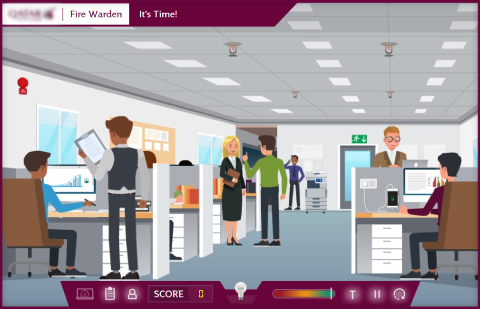In our previous blog Performance-Focused Learning Design, we delved into the principles of performance-focused learning design, emphasizing the importance of fostering true behavioral change through effective learning strategies. We explored how retrieval practice, scaffolding, and targeted content support can create robust learning experiences that lead to real-world performance improvements. Now, in this blog, we bring these concepts to life with a compelling case study on revamping Fire Warden training for an international airline. Discover how tailored, scenario-based learning solutions can enhance performance and cultivate a proactive safety culture.
Learning design for performance, while it shares the desired outcome of improved outcomes, differs in how solutions are designed. Here, instead of putting information into the world, we do need to get people to perform differently. We have specific goals in mind.
In this case, an international airline needed to update its Fire Warden training to remote delivery for COVID-19. This had to be done without compromising the quality. This is a volunteer role, assisting folks in safety procedures in case of a fire. Critical decisions include recognizing safety hazards and supporting folks during an evacuation. Also, other employees had to be compliant with the Fire Warden’s instructions.
Process
A major issue was the time taken for the training and looking for increased outcomes. Reducing the time, and/or increasing the effectiveness would be good outcomes. The desired solution would both be effective in creating improved outcomes and decreasing the time taken.
To begin, the critical tasks needed to be identified. With the support of the client, specific decisions were identified that were desirable elements of success. These decisions needed to be embedded in realistic situations with plausible alternatives. Given the importance, it was desired that the skills be scaffolded from beginning to knowledge to competent decisions.
The solution was to implement those decisions in scenarios where there was a contextual setup, critical decisions, and consequences. Given the nature of the situation, the practice environments included time constraints. This was preceded by knowledge practice, and then context exploration, exploring four different environments.
With the clock ticking, individuals needed to make decisions under time constraints. The benefits of this were to provide sufficient practice whereby individuals perform under pressure.
Feedback came in the form of a score. The distractors in the scenarios were designed to be plausible situations, and feedback drove learners back to the content.

Results
The delivery of this solution resulted in several performance outcomes. Affected were training duration, improved emergency response time, and as an additional benefit, employee volunteering.
As intended, the duration was reduced by 32%. This result provided suitable improvements over the previous solution. In addition, emergency response times diminished. This outcome, not necessarily targeted, was an improvement as well.
An unintended outcome was that volunteering for the fire warden role increased. Twelve percent more folks volunteered to take on the role compared to before the training.
Overall, this solution achieved the intended changes in performance. Safety was increased, even with a reduction in the time taken to prepare.
For organizations aiming to enhance performance through innovative learning solutions, the case study of revamping Fire Warden training for an international airline underscores the effectiveness of tailored, scenario-based learning. By focusing on critical tasks and embedding them in realistic contexts, training duration was significantly reduced while emergency response times improved. Unexpectedly, employees volunteering for critical safety roles also saw a notable increase. This success demonstrates that targeted, performance-focused learning designs not only achieve specific outcomes but also cultivate a culture of proactive safety engagement. For further insights into optimizing learning for performance, delve deeper into our eBook, Rethinking Learning: Focus on Performance.


















